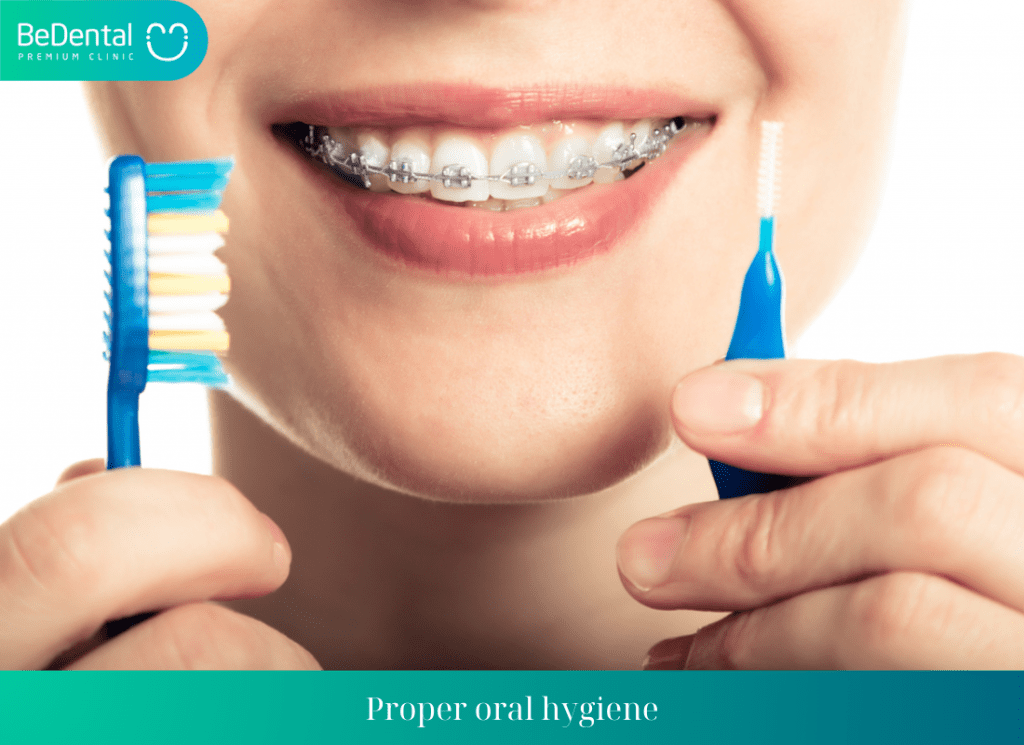Is getting dental veneers while pregnant safe? Pregnancy is a sensitive time for the body, so when it comes to procedures that may affect the mother’s body, such as getting dental veneers while pregnant, careful consideration should be taken. To learn more about this issue, pregnant mothers are invited to refer to the article from Be Dental below, to gain more information.
Does getting dental veneers while pregnant affect the fetus? Is getting dental veneers while pregnant safe?
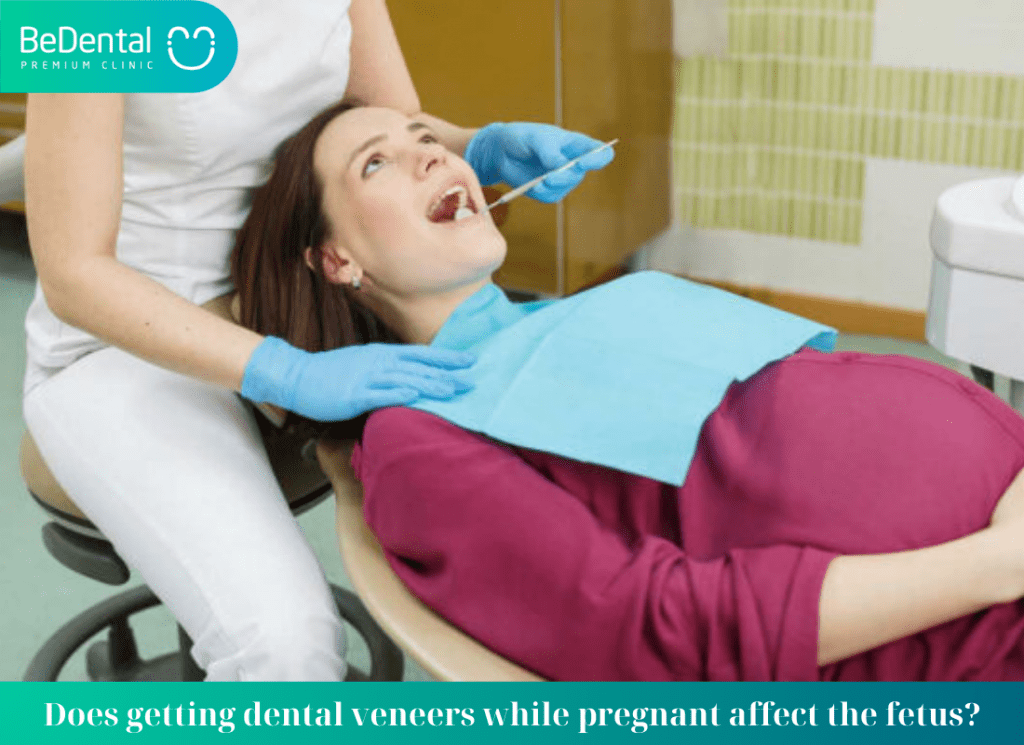
- During pregnancy, the mother’s body is very sensitive, and the condition of the fetus is still very delicate. Even small impacts can lead to unforeseen issues. Therefore, each dental visit, the dentist will be very cautious and limit direct impacts on the teeth.
- In addition, pregnant women should obtain approval from their obstetrician before undergoing any dental procedures to ensure the safety of both the mother and the fetus.
- Pregnant women can undergo dental treatments around the middle of the pregnancy, typically from the 3rd to the 6th month. During this period, the health of the fetus is usually stronger. It is generally not recommended for pregnant women to undergo dental procedures during the early and late stages of pregnancy, as it may affect the fetus later on.
- In the first three months of pregnancy, the baby is still in the early stages of development, so their health is fragile, and no interventions should be made on the mother’s body.
- In the later stages of pregnancy, the fetus has significantly developed, and excessive movement or prolonged sitting can affect the mother’s health and cause discomfort for the baby.
What should pregnant women pay attention to when undergoing dental treatments?
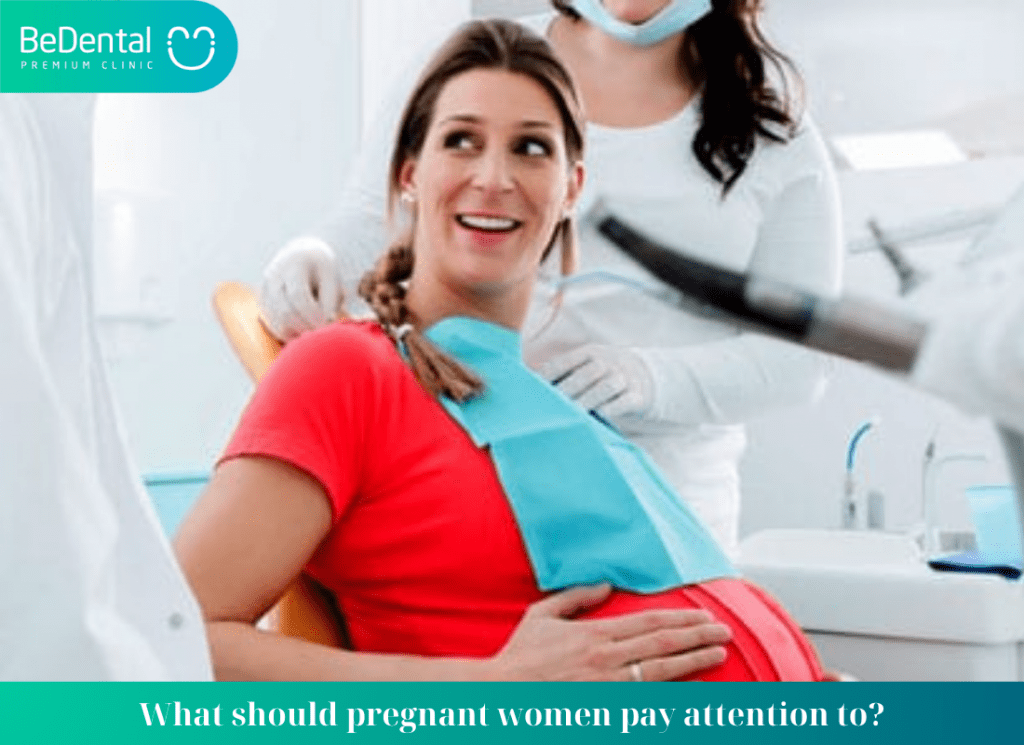
In addition to the question “Can pregnant women undergo dental treatment?”, it is important to pay attention to some key points when undergoing dental procedures.
- Before and during pregnancy, mothers should visit a reputable dental clinic or hospital for oral check-ups. Experienced specialist doctors will examine and provide timely guidance suitable for the individual’s health condition.
- Mothers should inform the doctor about their pregnancy status and the specific stage of pregnancy to receive appropriate attention, prescriptions, and treatment.
- It is recommended for mothers to undergo dental treatments in the 4th, 5th, and 6th months of pregnancy, around the second trimester, to ensure the safety of both the mother and the baby. During this period, the health of both the mother and the fetus is stable. Avoid extensive travel during the first three months of pregnancy when the fetus is still fragile. Additionally, the fetus undergoes significant development from the 7th month onwards.
- Pregnant women may experience difficulty and discomfort when sitting on the dental treatment chair. Therefore, it is important to take good care of oral hygiene at home.
- Mothers should consume plenty of green vegetables, supplement B vitamins such as B1, B12, and vitamin C to boost immunity against oral diseases.
- While sitting on the dental treatment chair, mothers should keep their legs straight for good blood circulation and use a high headrest to ensure comfort for both themselves and the fetus
- Listening to favorite music through headphones during dental treatment can be soothing for pregnant women.
There are certain treatments that pregnant women should avoid or not undergo.
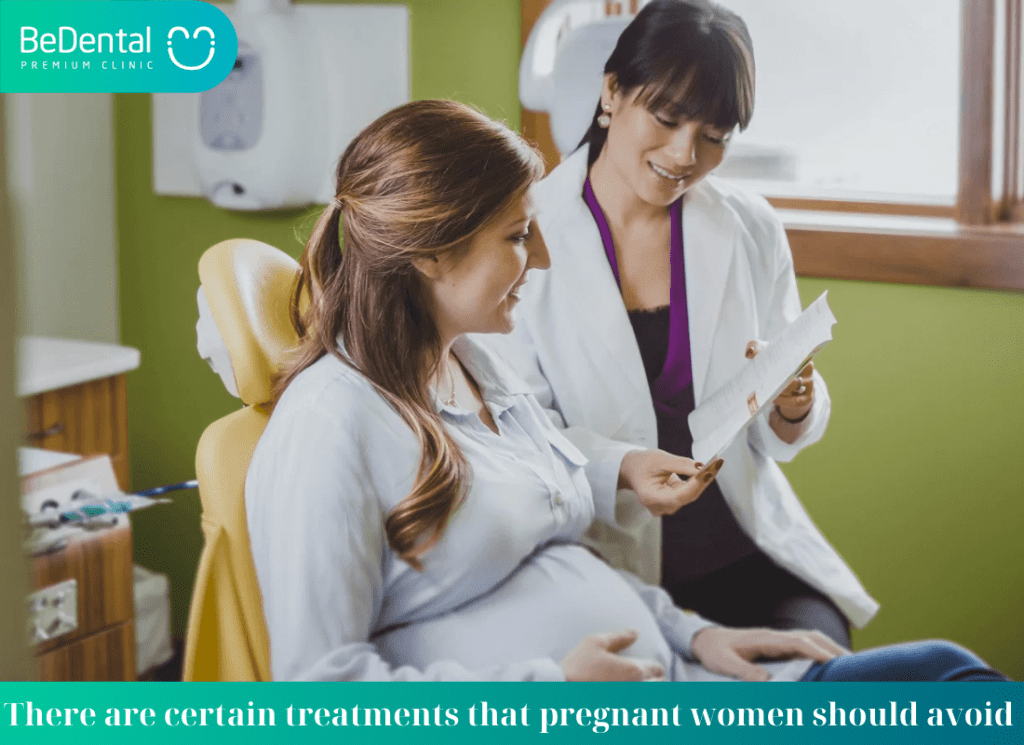
Treatments recommended for pregnant women
Scaling and root planing. This is not really a treatment but more of a preventive measure and general oral health check-up. Root planing is especially important for pregnant women.
We usually advise pregnant women to undergo scaling and root planing. Because, as analyzed above, this is a period with many hormonal fluctuations in the body that can have a negative impact on oral health, leading to more plaque buildup. During the scaling and root planing process, deep cavities or those at risk of becoming deep can be detected early and treated promptly.
See more: Tips for eliminating bad breath
Tooth extraction: Tooth extraction naturally requires anesthesia. And administering anesthesia means that chemicals will be introduced into the body. Most Obstetricians will not encourage or may prohibit this procedure during a woman’s pregnancy. However, depending on the stage of pregnancy (such as the second trimester) and with the approval of the Obstetrician, tooth extraction for pregnant women can still be performed.
Naturally, the dentist must consider the type of anesthesia used, the concentration and permissible dosage, as well as the prescription of medications thereafter. Considering the benefits of tooth extraction (pain reduction, prevention of infection caused by decayed teeth) versus the pain caused by keeping decayed teeth or the risk of infection for pregnant women is necessary.
Treatments not recommended for pregnant women
What are some Treatments not recommended for pregnant women? Let’s see the followings:
- X-rays: Should not be performed at any stage of pregnancy. Although the X-rays used in dentistry have very low densities, they should still be avoided. Because in practical treatment, dentists can still treat without the need for X-rays.
- Surgeries, minor surgeries should not be performed during this stage. Only perform surgery in emergency cases. And in this case, coordination with an Obstetrician is necessary.
The pregnancy stage is when a pregnant woman’s body is sensitive, even to minor impacts. Therefore, doctors always recommend not to intervene in oral health, including porcelain veneers.
See more: Does smoking pods cause yellow teeth?
During the process of placing porcelain veneers, anesthesia, pain-relieving medications, etc., need to be used, which are not beneficial for the health of the mother and the baby.
Especially during the first three months of pregnancy, the use of medications can cause congenital abnormalities in the fetus. Or during the last three months when the mother’s belly is quite large, frequent movements and long periods of sitting on the treatment chair can cause fatigue and discomfort for pregnant women.
Bedental cosmetic dentistry was established in 2012. After a period of operation, the center quickly became a reputable dental service provider for customers and a leading dental center in the field of cosmetic dentistry.
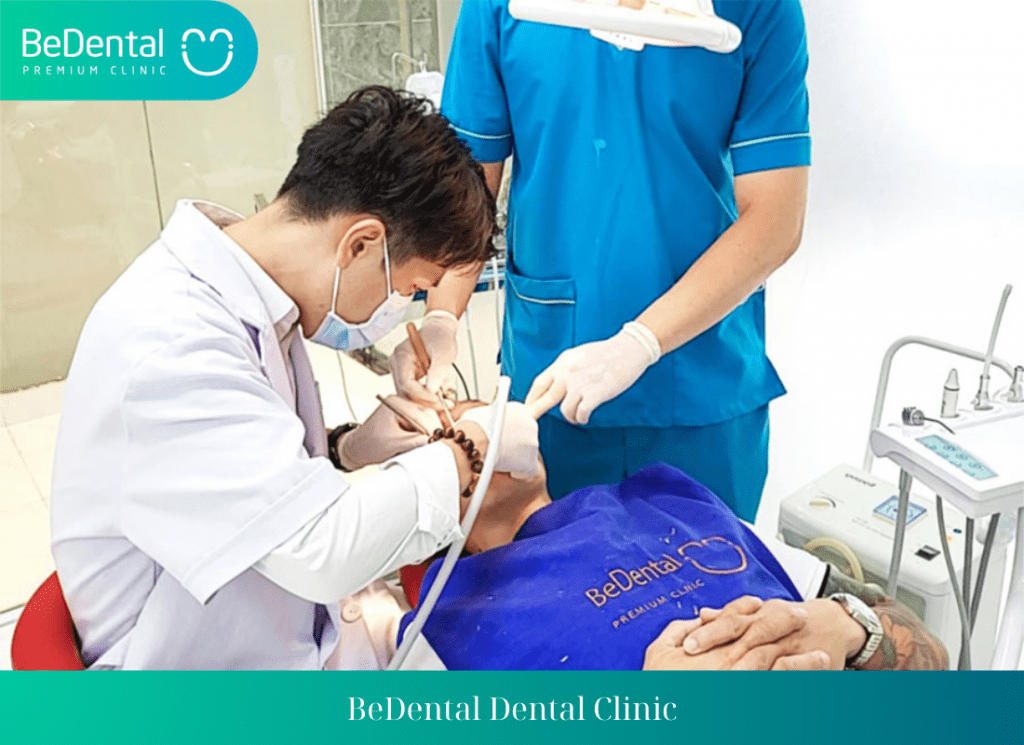
With a team of experienced doctors, advanced equipment, and modern technology, Bedental cosmetic dentistry has taken firm steps to become a leading cosmetic dental center in Vietnam.
Bedental was founded with the mission “Spread smiles, sow success”, we believe that everyone deserves to have a confident and charming smile. That’s why we always strive to address the issues and barriers that hinder your radiant smile.
Above all, we believe that strong teeth are the foundation of a happy life and a smile is the key to success. Bedental continues to strive to be a pioneer in the field of cosmetic dentistry, especially in dental porcelain restorations in Vietnam, with a strategy focused on the development of high technology and updating modern trends and techniques.
See more: Causes of cavities causing swollen gums
Is getting dental veneers while pregnant safe? – Most asked related questions
Are there alternative treatments or temporary solutions for dental issues during pregnancy
- Non-surgical gum treatments: Instead of invasive treatments like surgeries, non-surgical options such as professional dental cleanings, antimicrobial mouth rinses, and improved oral hygiene practices can be effective in treating gum disease during pregnancy
- Topical fluoride applications: Topical fluoride treatments can help strengthen tooth enamel and prevent tooth decay. These treatments are safe for pregnant women and can be applied by a dentist during regular check-ups.
- Temporary fillings or crowns: If a pregnant woman has a cavity or a damaged tooth that requires treatment, temporary fillings or crowns can be placed to provide relief until a more permanent solution can be pursued after pregnancy.
- Pain management techniques: For pregnant women experiencing dental pain, dentists can recommend safe pain management techniques such as over-the-counter pain relievers that are considered safe during pregnancy, as well as natural remedies like applying cold packs to reduce swelling and discomfort.
- Lifestyle and dietary adjustments: Maintaining a balanced diet, staying hydrated, and practicing good oral hygiene habits can help prevent or manage dental issues during pregnancy. Avoiding sugary foods and drinks, quitting smoking, and staying hydrated can contribute to better oral health.
- Consultation and monitoring: Regular dental check-ups and consultations with a dentist can help monitor oral health throughout pregnancy and address any emerging issues promptly. Dentists can provide guidance on preventive measures and treatments that are safe for pregnant women.
Are there specific guidelines or recommendations for dental care during each trimester of pregnancy
During pregnancy, it is essential for women to prioritize their oral health as hormonal changes and increased blood flow can affect the gums and teeth. While there are no hard and fast rules for dental care during each trimester of pregnancy, the following guidelines and recommendations can help pregnant women maintain good oral health throughout their pregnancy:
First Trimester:
- Inform your dentist about your pregnancy during your first visit.
- Schedule a dental check-up to address any existing dental issues.
- Avoid unnecessary dental treatments during this delicate period.
- Focus on maintaining good oral hygiene practices, including brushing and flossing regularly.
Second Trimester:
- Consider scheduling routine dental cleanings and check-ups during this trimester.
- Address any necessary dental treatments that are safe for pregnant women.
- Consult with your obstetrician and dentist before undergoing any dental procedures.
- Continue practicing good oral hygiene habits and follow any recommendations from your dental provider.
See more: The 10 most common oral diseases
Third Trimester:
- Continue with regular dental check-ups and cleanings as recommended by your dentist.
- Be mindful of changes in oral health, such as gum sensitivity or bleeding, and inform your dentist.
- Practice proper oral hygiene to prevent gum disease and tooth decay.
- Discuss any concerns or questions about dental care with your healthcare providers.
Overall, pregnant women should prioritize preventive measures, such as maintaining good oral hygiene, eating a balanced diet, and avoiding harmful habits like smoking, to promote their oral health and overall well-being during pregnancy. It is important to communicate openly with both your obstetrician and dentist to ensure that any dental care provided is safe and appropriate for your pregnancy stage.
Conclusion
In conclusion, Is getting dental veneers while pregnant safe?- Short answer: It depends. So, it is important for pregnant women to consider the potential risks and benefits of dental treatments, especially when it comes to procedures like porcelain veneers.
While some treatments, such as scaling and root planing, can be beneficial for maintaining oral health during pregnancy, others, like X-rays and surgeries, should be avoided unless absolutely necessary and approved by a healthcare provider.
See more: How much does filling a cavity cost?
What should pregnant women pay attention to? It is recommended for pregnant women to seek care from a trusted dental clinic to ensure the best support and guidance for their oral health needs during this sensitive stage of life. Therefore, through the article from Bedental dental clinic, we hope that pregnant women have a more comprehensive perspective on getting porcelain veneers while pregnant. If you have any issues with oral health, please visit a reputable dental clinic to receive the best support.
Tư vấn chuyên môn bài viết:
BÁC SĨ DƯƠNG THỊ THÙY NGA


